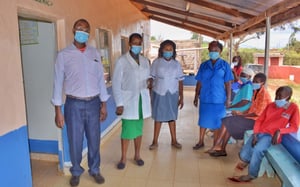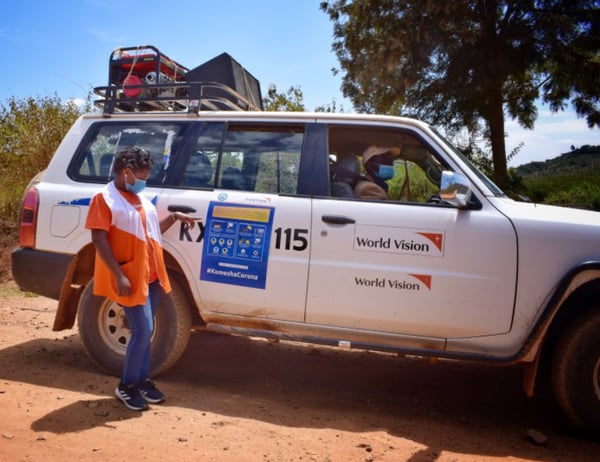 When news of a new virus hit the headlines of the world, 30-year-old Eunice Ngumbi’s (pictured center) medical intuition kicked in. She sensed in her spirit, that it would be only a matter of time before the contagious virus arrived in Kenya, given the speed at which it was spreading across the globe. Since 2016 when she joined the Muusini dispensary in Machakos County, as Hospital Charge, her major role has been to work with the community to help treat and prevent the spread of diseases within Mwala Community.
When news of a new virus hit the headlines of the world, 30-year-old Eunice Ngumbi’s (pictured center) medical intuition kicked in. She sensed in her spirit, that it would be only a matter of time before the contagious virus arrived in Kenya, given the speed at which it was spreading across the globe. Since 2016 when she joined the Muusini dispensary in Machakos County, as Hospital Charge, her major role has been to work with the community to help treat and prevent the spread of diseases within Mwala Community.
 Margaret reads hand washing information on a World Vision
Margaret reads hand washing information on a World Vision Eunice confirmed that the COVID-19 response plan has greatly contributed towards stopping or slowing the spread of coronavirus amongst households in Mwala. She says, “What World Vision did, was a partnership between Ministry of Health, Church Leaders and Local Administration on the ground to scale up prevention measures as well as teach communities how to deal with child protection issues, now that children are at home.” World Vision vehicles were branded with COVID-19 safety information and fitted with public address systems to reach over 43,000 with the safety message.
Margaret Matheka, World Vision, noted that during this time of the pandemic, the Mwala community has benefited from World Vision’s long-term water investment through the construction of Kangondi Water Project in the community. The water project supplies clean and portable water to almost all households including the Muusini Dispensary, providing the much-needed relief in the pandemic. Eunice notes, “I do not want to imagine what the community would do at this time without water. To fight this pandemic, access to water is key and I am glad World Vision did that long-term investment in this community many years ago.”
Eunice cannot hide her joy for what World Vision has done to make her work easier as she points to a hand washing facility with liquid soap, personal protective equipment and disinfectants that they use at the hospital. She says, “World Vision is helping us meet our target in providing good outpatient services to the community of Mwala. Now everyone in this community knows the importance of wearing a mask, hand washing and keeping social distance. What a gift to have World Vision in the community as a development partner.”







